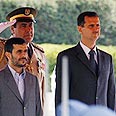
What does Assad want?
Syrian leader makes peace declarations while preparing for war
Had a stranger landed in our region this week, he would have been convinced we're heading for peace. President Bush called to convene a peace conference in the fall, while his Syrian counterpart followed suit and pled with Israel to embark on open negotiations. Yet in the Middle East, as is usually the case, talk is one thing and deeds are quite another.
Every few weeks Israelis find themselves asking: What's going through Assad's mind? After observing his moves and watching his speeches it is unclear whether he knows the answer himself. On the one hand, he keeps on talking about peace, again and again. On the other hand, he sets conditions which he knows Israel will find difficult to accept, conveys complete distrust in Jerusalem, and most importantly, does not abandon the option of "resistance," which he keeps on repeating more decisively since the last war.
But he is not merely talking about resistance, he is also preparing for it. While the Syrian ruler delivered speeches about peace, his Iranian counterpart prepared for a "congratulatory visit" to Damascus on the occasion of Bashar's second term in office. And in line with earlier predictions, Ahmadinejad did not only bring with him good wishes, but also business, and plenty of it.
The two signed a memorandum that would see Tehran transfer a billion dollars to its ally for the purpose of purchasing advanced Russian weapons, while also transferring its own arms and assisting in the establishment of military plants and instructing Syrian army officers.
This came in addition to a significant diplomatic chapter: A pledge by Assad – the same Assad who has been declaring his desire for peace – to refrain from moving forward in the peace process with Israel, in exchange for Iranian diplomatic backing for Syrian interests in Lebanon, that is, first paralyzing the country and then working to topple Siniora's government.
While in Damascus, the Iranian president also held meetings with Hassan Nasrallah and Khaled Mashaal, whose pockets he also padded with cash, not before praising him for applying Islamic law in Gaza.
Power of missiles
We're talking about a new phase in the tightening of the relationship between the two countries since Assad Sr joined forces with Iran during its war against Iraq in the 1980s, among other reasons because of his animosity to Saddam Hussein. During Bashar Assad's era it appears the ties are getting tighter to the point of a strategic alliance where Iran is the senior partner and Syria is the contractor, at best.
In this framework, Bashar Assad has visited Tehran five times in recent years and hosted Ahmadinejad twice since the latter was elected to his post. Last June, the two countries signed a comprehensive security memorandum, and this March the Iranian defense minister declared that his country would make its entire weapons arsenal available to Syria should this become necessary.
Yet it's not as if Assad is facing a grave situation. Recently it was reported that his country spent in the last year alone the immense sum of $1.5 billion to $2 billion on military acquisitions unrelated to the arms shipments it receives from Iran. This sum is more than Syria spent on military purchases in the last few years combined.
The estimate is that one of the lessons drawn by Damascus in the wake of the last war is that there is no difference between the military front and home front. Therefore, one should equip itself with missiles – many missiles – for the "benefit" of the Israeli front and home front. Ballistic missiles, anti-tank missiles, anti-aircraft missiles, and various types of rockets are replacing the old Syrian combat doctrine. This is apparently the same "resistance" Bashar Assad keeps talking about.
'Axis of evil party'
What does all of this mean? It means Assad is indeed talking about peace, but at the same time he is mostly vigorously preparing for war. After all, it's hard to connect his desire for a peace process with Israel to the "axis of evil party" organized in his palace with the participation of Ahmadinejad, Nasrallah, Khaled Mashaal, Ramadan Shalah and others. Had he wanted to, he could have insisted not to host the Iranian president a day after his peace speech. But apparently this wasn't really a burning concern.Moreover, Israeli sources that have been monitoring Assad are not at all certain he wishes to sacrifice his strategic alliance with Iran in favor of defecting to the western camp in exchange for a peace agreement with Israel. It appears that Tehran provides the Syrian president with a genuine sense of security, diplomatic air to breathe, military procurements, a strategic home front, and mostly, a real alternative.
The situation, it appears, is quite at a dead end on all sides of the triangle – Washington, Syria and Israel – and the breaking of the current freeze is not in sight. Therefore, Assad realizes that with all due respect to peace talk, there are more important things that need to be done, and there are arenas that are no less important than Israel – Lebanon, for example, where some issues have to be finalized in the near future, such as the next president's identity. With Iran by its side, Syria will certainly feel more confident when it comes to interfering in what's going on in Beirut.
So what's to do? Mostly receive much more of the same, that is, growing tension and escalating declarations, talk of resistance and preparations for it. The genuine fear is that someone who talks so much about "resistance" will eventually be tempted to do something – and the missile presented in the first act may end up being launched in the third act.










